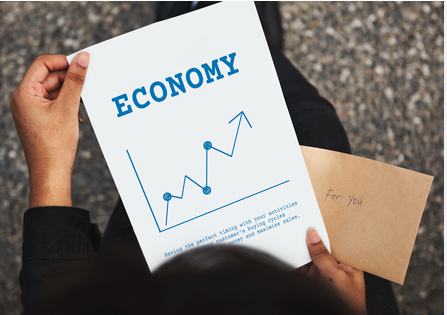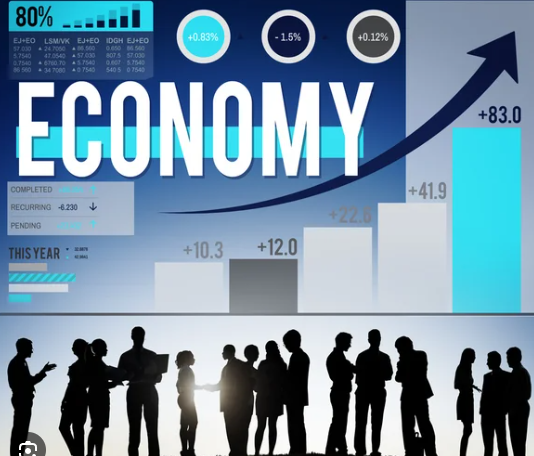AN INTRODUCTION TO ECONOMICS методична розробка з дисципліни «Іноземна мова ( за професійним спрямуванням)» в закладах фахової передвищої освіти
Лисичанський промислово-технологічний фаховий коледж

AN INTRODUCTION TO ECONOMICS
методична розробка
з дисципліни «Іноземна мова ( за професійним спрямуванням)»
в закладах фахової передвищої освіти
Розробник: Скиба Н.М., старший викладач, викладач вищої категорії Лисичанського промислово-технологічного фахового коледжу
2024
ВСТУП
Методична розробка заняття виконана у відповідності з методичними рекомендаціями з підготовки та проведення практичних занять у закладах фахової передвищої освіти. Заняття підготовлено відповідно до робочої і навчальної програми з дисципліни «Іноземна мова ( за професійним спрямуванням)». У методичній розробці заняття подано розгорнутий план-конспект заняття у формі мовного практикуму з використанням методу критичного мислення, методики роботи з лексичним матеріалом, методу лінгвістичного квесту, рольовою грою, перелік літератури та необхідного обладнання, мету і задачі, надано чітку структуру заняття, вдало подано мотивацію пізнавальної діяльності студентів.
Розробка містить багато різноманітних форм та методів роботи (бесіду, читання, мозковий штурм, аудіювання з використанням тематичного відеоролику, роботу з мультимедійними презентаціями, групову та парну роботу,), що відповідають психофізіологічним та індивідуальним особливостям студентів і сприяють успішному досягненню мети заняття.
Методична розробка відкритого заняття відповідає теоретичному й методико-практичному розділам навчальної програми, має інноваційний характер, відповідає новітнім технологіям навчання, спрямована на формування комунікативної компетенції майбутніх фахівців, розвиток пам'яті, уваги, фонематичного слуху студентів, сприяють зацікавленості та формуванню комунікативної компетенції майбутніх фахівців.
Методична розробка може бути рекомендована для викладачів іноземної мови в закладах фахової передвищої освіти в якості як основного, так і довідково-дидактичного матеріалу.
МЕТОДИЧНА РОЗРОБКА ЗАНЯТТЯ
Заняття №
Предмет: Іноземна мова
Група:
Тема заняття: AN INTRODUCTION TO ECONOMICS
Мета: формувати лексичні навички й навички вимови; вдосконалювати навички читання й усного мовлення; розвивати мовну здогадку й мовленнєву реакцію; виховувати зацікавленість у розширенні своїх знань, використовувати раніше вивчені структури, а також збагачувати словарний запас, практикуватися у перекладі речень, розвивати навички логічного викладання думок, пам'ять, виховувати свідоме ставлення до навчання, вчити раціонально використовувати свій час, прищеплювати бажання вивчати іноземну мову.
Обладнання: словники, комп’ютер, роздавальний матеріал
Тип заняття: практичне
Міжпредметні зв'язки: Економіка підприємства, Статистика, Фінанси підприємства, Економічний аналіз, Організація виробництва, Менеджмент, Маркетинг
СТРУКТУРА ЗАНЯТТЯ:
1.Організаційний момент:
1)Привітання
2) Перекличка
3)Перевірка готовності до заняття
2. Мотивація навчальної та пізнавальної діяльності студентів, оголошення теми та цілей заняття.
3.Реалізація теми за планом
4. Підсумок заняття. Оцінювання
5. Домашнє завдання
ХІД ЗАНЯТТЯ:
I. Scanning reading. Читання з повним розумінням змісту прочитаного.
Read the text AN INTRODUCTION TO ECONOMICS Use a dictionary, if necessary.
Economics is a social science that seeks to analyze and describe the production, distribution, and consumption of goods and services. Economics studies how individuals and societies seek to satisfy needs and wants through incentives, choices, and allocation of scarce resources. As a social science economics studies the social relationship of individuals. But unlike other social sciences, economics concentrates its study on the economy.

The word "economics" is from the Greek words οἶκος [oikos], meaning "family, household, estate," and νόμος [nomos], or "custom, law," and hence literally means "household management" or "management of the state." The management of society's resources is important because resources are scarce. Scarcity means that society has less to offer than people wish to have. Just as a household cannot give every member everything he or she wants, a society cannot give every individual the highest standard of living to which he or she might aspire.
Economics is the study of how society manages its scarce resources. In most societies, resources are allocated not by a single central planner but through the combined actions of millions of households and firms.
The major divisions of economics include microeconomics, which deals with the behaviour of individual consumers, companies, traders, and farmers; and macroeconomics, which focuses on aggregates such as the level of income in an economy, the volume of total employment, and the flow of investment.
Macroeconomics is the study of entire economy. The word macroeconomics means economics in the large. Macroeconomists measure overall economic activity, analyse the determinants of such activity by the use of macroeconomic theory: forecast future economic activity and attempt to formulate policy responses designed to reconcile forecasts with target values of production, employment and prices. An important task of macroeconomics is to develop ways of aggregating the values of the economic activities of individuals and firms into meaningful totals. To this end such concepts as gross domestic product (GDP), national income, personal income, and personal disposable income have been developed. Macroeconomics is concerned with such major policy issues as the attainment and maintenance of full employment and price stability.
Microeconomics is the study of parts of the economy. The word”micro” means small and microeconomics means economics in the small. The optimising behavior of individual units such as households and the firms provides the foundation for microeconomics.
Microeconomists may investigate individual markets or even the economy as a whole, but their analyses are derived from the aggregation of the behavior of individual units. Microeconomic theory is used extensively in many areas of applied economics. It is used, for example, in industrial organisation, labor economics, international trade, cost-benefit analysis and many other economic subfields.
While microeconomics and macroeconomics view the economy from different perspectives, both are important. Scientific theories are used to explain economic activity in the world. The theories consist of sets of economic principles that abstract from the real world, similar to the way a road map abstracts from the world. A principle is obtained by continuously testing a hypothesis to see if it corresponds to activity in the world. Positive economics describes the way the world actually operates, and normative economics suggests how the world should operate. Positive economics is based on testable hypothesis, which can be proved false. Normative economics is based on an individual’s values, which cannot be proved either right or wrong.
The areas of investigation in economics overlap with other social sciences, particularly political science, but economics is primarily concerned with relations between buyer and seller. The economist seeks to identify the benefits and costs of any activity. Since marginal changes in benefits and costs from an activity are the basis for most choices, such changes tend to attract the economist’s attention. Economists also use economic theories to recommend policies to the government.
ІІ Study carefully the meaning of the following phrases and word combinations to avoid any difficulty in understanding the following text.
|
household account to take into account to allocate scarce scarcity to satisfy unlimited wants goods and services commodity resource to invest investment income national income personal income
|
personal disposable income facet to recur fraction total production total employment the rate of change of overall prices rate of economic growth layoff economic activity determinants values meaningful totals gross domestic product (GDP) attainment price stability
|
ІІI. Give English equivalents to the following:
Економіка, економічна теорія, виробництво, споживання, розподіл, обмін, дефіцит, дохід, рівень життя, вивчення поведінки у сферах виробництва, фізичні особи, обмеженість ресурсів, безмежні потреби, задоволення своїх бажань та потреб, предмет економічної теорії, малі економічні одиниці, великомасштабні економічні явища, економічний аналіз, зайнятість населення, товари та послуги, національний дохід, стабільність, оптимізація, нестача робочої сили.

IV. Read the international words and guess their meanings:
Economic activity, economic system, macroeconomics, microeconomics, to produce, to operate, to protect, to analyze, to finance, to manufacture, to specialize, to focus, to affect, service, school, hospital, garage, fact, base, production, material, industry, radio, strategy, status, export, import, institution, distribution, division, investment, history, organization, period, spectrum, agriculture, essential, basic, industrialized, oriented (policy), national, financial, social, major, fact, base, total, primarily, public.
V. Are the following statements true or false?
- There is no brief description of the content and character of economics.
- Economics is only a theoretical science.
- Economics deals with the problem of income, employment and interest rates.
- Economics also deals with weather forecasting, psychology and fantasy writing.
- In recent years economists switched to the new fields, such as political science and sociology.
- Macroeconomics deals with global questions only.
- Macroeconomics means economics in the large because it asks more questions than microeconomics.
- Macroeconomist analyses activities of families and large firms.
- Such concepts as gross domestic product, national income and personal disposable income serve as meaningful totals.
- Macroeconomic analysis shows the development of the economic theory.
-

VI. Fill in the gaps using the words given:
Scarcity, income, interact, society, trends, management, economics, economy
- The word ______ comes from the Greek word for "one who manages a household.''
- Like a household, a _____ faces many decisions.
- The _____ of society's resources is important because resources are scarce.
- _____ means that society has less to offer than people wish to have.
- _____ is the study of how society manages its scarce resources.
- Economists also study how people _____ with one another.
- Economists analyze forces and _____ that affect the economy as a whole, including the growth in average _____, the fraction of the population that cannot find work, and the rate at which prices are rising.
VII. Translate into English
- Світова економіка – це наука, яка вивчає стан економіки різних країнах світу.
- Економіка - громадська наука, що вивчає поведінку у сферах виробництва, споживання, розподілу та обміну. Економісти аналізують процеси, що відбуваються в цих сферах, і досліджують їх наслідки для фізичних осіб, організацій, наприклад фірм, і суспільства в цілому.
- Стан економіки (економічного середовища) має значення для успішної діяльності фірм.
- Під час вивчення економіки необхідно розрізняти позитивну та нормативну економічні теорії. Якщо в позитивній теорії ми можемо залишатися неупередженими, незалежно від наших політичних переконань, то нормативна теорія ґрунтується на особистій системі цінностей.
- Позитивна теорія може запропонувати низку можливих альтернатив, у тому числі індивід чи суспільство загалом обирають найбільш пріоритетні.
- Макроекономіка – це з основних розділів економічної теорії, яка вивчає поведінка економіки як єдиного цілого.
- Макроекономіка аналізує взаємодію чинників, які впливають зростання національного виробництва, і навіть такі процеси, як безробіття, інфляція тощо.
- Об'єктом макроекономіки є саме взаємодія цих величин усередині економіки, причому самі ці величини розглядаються спрощено, абстрактно.
- Мікроекономіка - це один з основних розділів економічної теорії, що вивчає поведінку окремих економічних одиниць, їх взаємодія на ринках, в результаті якого формуються ціни на вироблені товари та послуги.
- Мікроекономіка прагне детального розгляду поведінки будь-якої економічної одиниці.
Summarizing. Підведення підсумків уроку. Бесіда в режимі T-P1
P2.
T: What topic did we start discussing today? What did we read about? What new words and word combinations have you learned? What material was difficult/ interesting/boring? So, you all see where you need more practice and what you can do well.
Setting homework. Постановка домашнього завдання
T: Your home task is to write a essay on the following topic AN INTRODUCTION TO ECONOMICS .Use your notes from class!


про публікацію авторської розробки
Додати розробку
